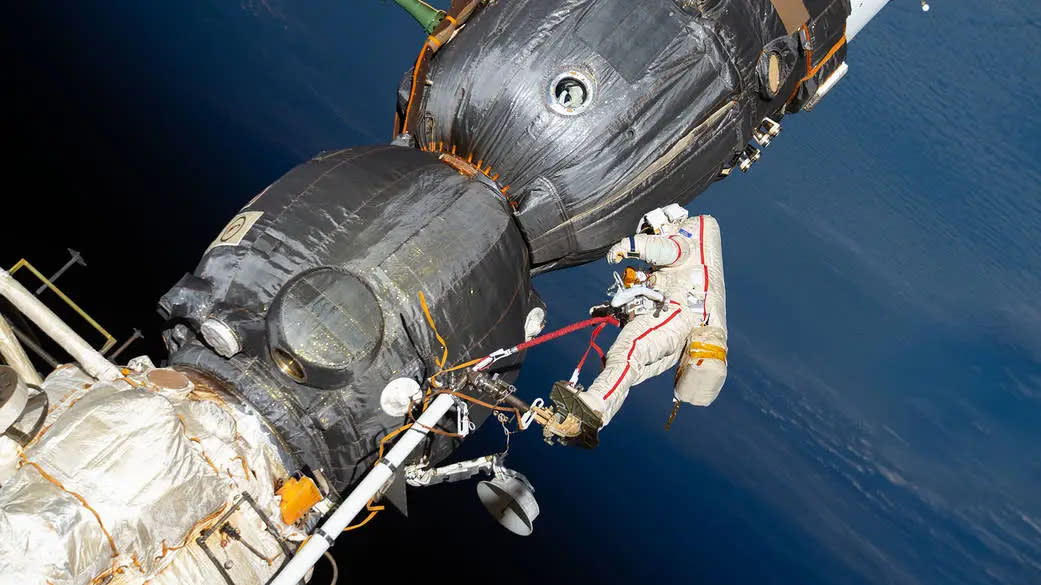Cosmonauts will hunt for source of ISS leak during a spacewalk today. Watch it live

Two cosmonauts will investigate a space station leak during a spacewalk today (Oct. 25), and you can watch it live.
The cosmonauts, from Russia's federal space agency Roscosmos, are scheduled to step outside the International Space Station (ISS) today at 1:55 p.m. EDT (1755 GMT) on a spacewalk expected to last up to seven hours. You can watch live here, via NASA Television, starting at 1:30 p.m. EDT (1730 GMT).
Expedition 70 cosmonauts Oleg Kononenko and Nikolai Chub will install communications hardware, release a nanosatellite, and look at a suspected leaky radiator on Russia's new Nauka science module. The 13-year-old backup radiator was transferred from another Russian module, called Rassvet, during a spacewalk in April.
On Oct. 9, a coolant leak briefly sprang up on the Russian side of the ISS. Footage and crew observations suggest it originated around the radiator. While Nauka's primary radiator continues to work well and the backup radiator stopped leaking within hours, NASA postponed two of its own spacewalks this month as a precaution.
Related: NASA delays spacewalk a 2nd time due to leak on International Space Station
Kononenko, on his sixth spacewalk, will wear a Russian Orlan spacesuit with red stripes. By coincidence, he has been on leak duty before during a spacewalk; he also examined a Russian Soyuz spacecraft in December 2018 that experienced a pressure leak, possibly due to testing or manufacturing issues prior to launch. Chub, performing his first spacewalk, will wear an unmarked spacesuit. It is the 268th spacewalk overall in support of ISSmaintenance.
The ammonia coolant leak at Nauka is the third in Russian ISS hardware in the past year. The first leak took place in December 2022 in a Soyuz spacecraft designed to carry astronauts. Its three-person crew was eventually reassigned to a replacement Soyuz.
Due to various scheduling matters, the three astronauts waited an extra six months to come back to Earth and doubled their ISS stay to a year. A Russian robotic Progress cargo spacecraft suffered a leak as well, in February 2023. Russia has said those two previous leaks were likely due to micrometeoroid strikes, but the latest one at Nauka remains under investigation.
RELATED STORIES:
— International Space Station leaks coolant into space, but astronauts are not in danger
— Russia releases 1st images of damage to leaky Soyuz spacecraft (photos)
— Leaky Soyuz spacecraft at space station returns to Earth in speedy landing
NASA officials have emphasized that the ISS crew is not in danger from the recently detected leak and that space station operations this month were not unduly affected, as the two postponed U.S. spacewalks were for minor maintenance matters. NASA has also said that the agency delayed its planned spacewalks as a precaution, as "experts are discussing how to best keep small traces of the substance from getting into some internal systems to avoid equipment degradation over time." (Ammonia is a toxic substance, and spacewalks working nearby must take extra decontamination procedures, if flakes of the stuff are present.)
The spacewalking cosmonauts today will use "post spacewalk procedures", again as a precaution, to reduce the chance of ammonia getting inside the ISS even though analysis, examining imagery and similar tests showed there is only a "very low" chance, NASA officials added in an update Wednesday (Oct. 24). The spacesuits and tools will be inspected for signs of coolant, and the spacewalkers will also wipe down their tools and suits after entering the ISS (which they usually do anyway.) Also, the ISS will use "additional filtration ... to quickly scrub the atmosphere of any remaining traces of contaminant."
So far, NASA does plan to go ahead with a rare all-woman spacewalk on Oct. 30 (following a postponement) with NASA astronauts Loral O'Hara and Jasmin Moghbeli. Their spacewalk will be the fourth all-woman spacewalk ever, following a trio by NASA astronauts Christina Koch and Jessica Meir in 2019 and 2020.
O'Hara and European Space Agency astronaut Andreas Mogensen are scheduled for a second spacewalk later in 2024, which was also postponed from October due to the leak.
